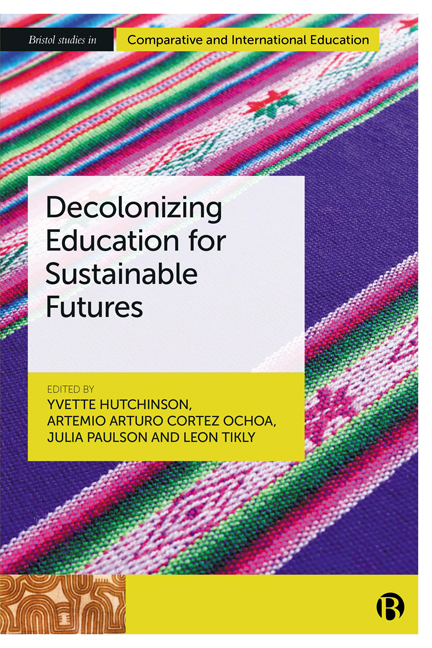Book contents
- Frontmatter
- Contents
- Series Editor Preface
- List of Figures and Table
- List of Abbreviations
- Notes on Contributors
- Acknowledgements
- Introduction
- PART I Connecting Decolonial and Sustainable Futures in Education
- PART II Decolonizing Education for Sustainable Futures: From Theory to Practice
- PART III Education’s Reparative Possibilities: Responsibilities and Reckonings for Sustainable Futures
- Conclusion
- Afterword
- Index
12 - Reparative Pedagogies
Published online by Cambridge University Press: 18 January 2024
- Frontmatter
- Contents
- Series Editor Preface
- List of Figures and Table
- List of Abbreviations
- Notes on Contributors
- Acknowledgements
- Introduction
- PART I Connecting Decolonial and Sustainable Futures in Education
- PART II Decolonizing Education for Sustainable Futures: From Theory to Practice
- PART III Education’s Reparative Possibilities: Responsibilities and Reckonings for Sustainable Futures
- Conclusion
- Afterword
- Index
Summary
Introduction
This chapter explores reparative possibilities in and through education, with a specific focus on reparative pedagogy. It does so by sharing examples I’ve encountered and by documenting many ongoing conversations around the possibilities and challenges of describing, designing and imagining pedagogy as reparative. These include conversations with friends, researchers, educators and activists, many (but not all) of which take place within the Education, Justice and Memory network (EdJAM). EdJAM exists to support and learn more about creative approaches to teaching and learning about past violence and injustice and currently works in 18 countries. Some of the people with whom I’ve been in conversation describe their work using the term ‘reparative pedagogy’. Others do not, but, as this chapter argues, there are features of their pedagogical approaches that align with and enable repair and reparation and therefore allow for the possibility of describing them as reparative.
As discussed in more detail later in the chapter, reparation generally, and in its application to education specifically, is often described as encompassing material, symbolic, epistemic and affective measures to right wrongs of the past. There is growing attention to what Arathi Sriprakash and colleagues (Chapter 10 in this volume, and 2022) call ‘reparative futures in education’ and to education's roles in enabling reparative measures across the domains listed here (see, for example, Ramirez-Barat and Duthie, 2016; Bellino et al, 2017). The material, symbolic, epistemic and affective are all present within pedagogy, and pedagogy could therefore contribute towards these types of reparative measures. This chapter, however, explores the possibilities for understanding reparative pedagogies in their own right, as another form of reparation. One motivation for this is to recognize the ongoing work by educators, artists, activists and students in this area. Reparative pedagogies can, and do, proceed without waiting for formalized programmes of reparation, transitional justice or systemic reforms to the structural injustices that permeate the education systems that they might complement. In not recognizing, describing and seeking to support reparative pedagogies, we risk missing spaces where futures of education are reimagined through pedagogical approaches to acknowledge and reckon with past injustices and their afterlives in the present.
- Type
- Chapter
- Information
- Decolonizing Education for Sustainable Futures , pp. 220 - 240Publisher: Bristol University PressPrint publication year: 2023



